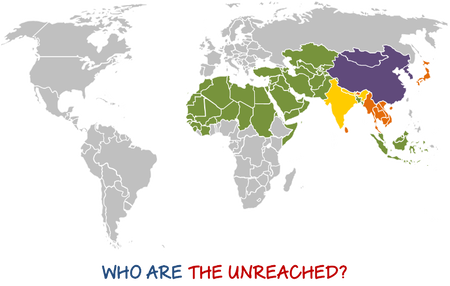GLOBAL STARTING POINTS
Global Starting Points serve as the foundation for understanding global disciple-making. It lays the groundwork for the subsequent action steps, ultimately aiming to become SOGY—Support Others or Go Yourself.
1. The unceasing mission of God is the redemption of all peoples.
God wants everyone to be saved and to understand the truth. 1 Timothy 2:4
God's relentless pursuit of all individuals globally is driven by His desire to restore them to Himself. He recognizes that forgiveness is our greatest need, and worship is our highest joy. In governing global situations and events, God adheres to one sovereign principle: making Himself known. This unfolds because of His supreme power, immense love, and our desperate need for Him.
2. The ultimate plan of God is worship by all peoples.
After this I saw a vast crowd, too great to count, from every nation and tribe and people and language, standing in front of the throne and before the Lamb. Revelation 7:9
|
God's profound desire is to engage in fellowship with humanity, yearning for communion with His people. This longing prompted the sending of Jesus into the world, with the overarching plan that people from every era and ethnicity would honor God through the declaration of His glory in worship. The ultimate vision of heaven encompasses believers from all backgrounds, united in endless, joyous praise.
|
Missions exists because worship doesn’t. — John Piper |
The Greek term for "nation" is "ethnos" (εθνος), from which the word "ethnic" is derived. In biblical terms, it denotes people groups rather than countries, highlighting the significance of understanding this distinction. While there are nearly two hundred countries globally, there exist over sixteen thousand distinct people groups. Author Jason Mandryk emphasizes that these people groups are fundamental units in God's plan for the redemption of humanity, a non-negotiable biblical reality.
For evangelistic purposes, a people group is defined as "the largest gathering of people the gospel exists in without barriers of understanding and acceptance." This definition considers two crucial factors: language (understanding) and culture (acceptance).
Language plays a pivotal role, with adjacent groups sometimes speaking entirely different languages, hindering mutual comprehension. Culture, on the other hand, revolves around shared answers to the question "What is true?" It shapes worldviews, religious beliefs, and social practices, potentially leading to conflicts or prejudices between groups.
Understanding and acceptance, define the uniqueness of a people group. Some are small, numbering in the thousands, while others are massive, exceeding millions. The diversity is vast, with the two largest groups, the Shaikh of Bangladesh and the Japanese, each surpassing 100 million individuals. This intricate tapestry of people groups underscores the multifaceted nature of God's redemptive plan for humanity.
For evangelistic purposes, a people group is defined as "the largest gathering of people the gospel exists in without barriers of understanding and acceptance." This definition considers two crucial factors: language (understanding) and culture (acceptance).
Language plays a pivotal role, with adjacent groups sometimes speaking entirely different languages, hindering mutual comprehension. Culture, on the other hand, revolves around shared answers to the question "What is true?" It shapes worldviews, religious beliefs, and social practices, potentially leading to conflicts or prejudices between groups.
Understanding and acceptance, define the uniqueness of a people group. Some are small, numbering in the thousands, while others are massive, exceeding millions. The diversity is vast, with the two largest groups, the Shaikh of Bangladesh and the Japanese, each surpassing 100 million individuals. This intricate tapestry of people groups underscores the multifaceted nature of God's redemptive plan for humanity.
3. The urgent challenge is unreached peoples.
How can they believe in Him if they have never heard about Him? Romans 10:14
Unreached people groups, numbering over two billion individuals, have not been reached with the gospel, constituting over 40 percent of humanity. These groups lack access to Christians, churches, Bibles, and the gospel itself. A staggering 86 percent of Buddhists, Hindus, and Muslims do not have a single Christian friend, highlighting the vast scope of this challenge.
Unreached people groups, totaling over six thousand, require external assistance as they lack sufficient local evangelists. Among them, the top one hundred groups range from six to over 100 million people.
Tragically, approximately 60,000 unreached individuals die daily without hearing about Jesus Christ, representing a monumental global crisis. This situation is an urgent call for the Church to fulfill its responsibility, echoing Oswald J. Smith's poignant reminder, “No one has the right to hear the gospel twice, while there remains someone who has not heard it once.”
Unreached people groups fall into five categories summarized by the acronym THUMB: Tribal, Hindu, Unreligious, Muslim, and Buddhist.
Within the unreached, there are the unengaged, numbering 70 million, who currently have no one actively seeking to bring them the gospel, making them the most neglected and vulnerable. This dire reality emphasizes the imperative for Christians to address the global challenge of unreached and unengaged people groups.
Unreached people groups, totaling over six thousand, require external assistance as they lack sufficient local evangelists. Among them, the top one hundred groups range from six to over 100 million people.
Tragically, approximately 60,000 unreached individuals die daily without hearing about Jesus Christ, representing a monumental global crisis. This situation is an urgent call for the Church to fulfill its responsibility, echoing Oswald J. Smith's poignant reminder, “No one has the right to hear the gospel twice, while there remains someone who has not heard it once.”
Unreached people groups fall into five categories summarized by the acronym THUMB: Tribal, Hindu, Unreligious, Muslim, and Buddhist.
Within the unreached, there are the unengaged, numbering 70 million, who currently have no one actively seeking to bring them the gospel, making them the most neglected and vulnerable. This dire reality emphasizes the imperative for Christians to address the global challenge of unreached and unengaged people groups.
Resources:
- Watch: What is a UPG? (2:59)
- Watch: Reaching the Unreached (4:19)
- Watch: Understanding the Remaining Task (6:41)
- Watch: State of the World (4:36)
- Watch: 3.2 Billion People (2:47)
- View: Joshua Project
4. The unchanging strategy of God is for the reached to go to the unreached.
As the Father has sent me, so I am sending you. (John 20:21)

The nature of the gospel is relational, therefore it's best understood and most effectively spread person to person. Redeemed to unredeemed; reached to unreached.
God has always been engaged in redeeming the lost by the work of one person (Jesus Christ) through the witness of one people (Christians).
Since the purpose of the Church is to evangelize the unevangelized, it just makes sense that the Church should do everything it can to get the gospel to those who need it most, as urgently as possible. Every program, policy, procedure, practice, and plan should align with this one supreme and desperate mission. Unreached people are the critical endgame of every local Church.
God has always been engaged in redeeming the lost by the work of one person (Jesus Christ) through the witness of one people (Christians).
Since the purpose of the Church is to evangelize the unevangelized, it just makes sense that the Church should do everything it can to get the gospel to those who need it most, as urgently as possible. Every program, policy, procedure, practice, and plan should align with this one supreme and desperate mission. Unreached people are the critical endgame of every local Church.
|
It is just as shocking to discover how disproportionately the Church is allocating its resources. Only three percent of missionaries from North America serve among the unreached. Only one percent of the money given by churches to missions goes towards bringing the gospel to unreached peoples.
|
God has one mission—all nations, and one method—all believers. — Claude Hickman |
The unreached live in the most challenging places to get to and the most dangerous locations to serve, but they must be reached no matter what the cost! Since our past is forgiven, our future is secure, and our mission is worthy, we have nothing to lose and everything to risk. As one worker said, "The unreached are unreached because they are so hard to get to and stay among. We can't let hard stop us."
Resources:
|
It is better to lose your life than waste it. — John Piper |
5. The goal of global disciple-making is to become SOGY.
|
SOGY stands for Support Others or Go Yourself. Supporting others is crucial, as, on average, for every two people who go overseas for missionary work, eight individuals remain behind to provide support. This eighty percent plays a vital role in sustaining the work of the twenty percent actively engaged in missions. Without the prayer and financial support of this majority, mission endeavors would face significant challenges.
Resources:
|
Part 2. Information about Supporting Others
6. Support American workers serving overseas.
|
Support for overseas missions involves various forms of encouragement, such as notes, care packages, consistent prayers, and regular financial contributions. Additionally, a well-planned personal visit can be a meaningful way to provide support.
Stateside support encompasses assistance with transportation, housing, medical matters, and other specific needs. |
Salvation has come to us because it’s on its way to someone else. —Todd Ahrend |
Crucially, it also involves offering friendship, fellowship, and aiding in the process of reentry. Returning to the United States can be challenging, given the contrasting pace of life compared to the overseas mission field. Reentry shock is a real experience, and some may feel like a few years away equate to a much longer time, making the adjustment significant. It's vital to recognize that for missionaries, "home" is where they serve, not necessarily when they return stateside.
7. Support national workers serving in their home countries.
Indigenous workers, also known as nationals, play a crucial role in serving within their homelands. Supporting them is strategically valuable as they possess citizenship and are already acclimated to the culture, including language, diet, climate, and other local nuances. Adjusting to these aspects can be challenging for expatriates, making nationals essential contributors to the mission field.
For effective support, it is advisable to channel financial assistance through recognized sending agencies. This ensures a structured and accountable approach to supporting indigenous workers.
For effective support, it is advisable to channel financial assistance through recognized sending agencies. This ensures a structured and accountable approach to supporting indigenous workers.
Resources:
|
May your ways be known throughout the earth, your saving power among people everywhere. —Psalm 67:2 |
8. Support strategically by partnering with those working among the unreached.
So, we ourselves should support them (the traveling teachers) so that we can be partners as they teach the truth. (3 John 8)

To effectively support those working among the unreached THUMB peoples (Tribal, Hindu, Unreligious, Muslim, and Buddhist), consider the following:
Remember, your support plays a crucial role in making the gospel accessible to those who have yet to hear it.
- Prayer Support: Regularly pray for workers engaged in reaching each of the unreached people groups. Pray for their safety, effectiveness, and spiritual strength. Pray for open hearts among the unreached and for opportunities to share the gospel.
- Financial Support: Contribute financially to organizations and individuals actively working among the unreached. Financial support can fund various aspects of outreach, including mission trips, language translation, and community development projects.
- Resource Provision: Provide resources that can aid in the mission efforts, such as Bibles, educational materials, or medical supplies. Understand the specific needs of each group and contribute accordingly.
- Awareness and Advocacy: Raise awareness about the unreached people groups and the importance of reaching them with the gospel. Advocate for missions within your community and church, encouraging others to get involved in supporting or participating in mission work.
- Networking: Connect with mission agencies and organizations focusing on the unreached THUMB peoples. Explore opportunities for collaboration and partnership in spreading the gospel and meeting the practical needs of these communities.
Remember, your support plays a crucial role in making the gospel accessible to those who have yet to hear it.
Resources:
9. Support agencies that help workers in the field.

Certainly, partnering with ministries that offer practical support, such as medical, agricultural, sanitation, and educational assistance, is a valuable way to support overseas workers. These support services can significantly enhance the effectiveness of those engaged in sharing the gospel. By addressing basic needs and providing essential resources, such ministries contribute to the overall well-being of communities and create opportunities for deeper connections with the local population.
In areas where access to healthcare is limited, medical assistance can not only alleviate suffering, but also serve as a tangible expression of God's love and compassion. Similarly, agricultural support can enhance food security and sustainable living conditions, positively impacting the livelihoods of individuals within the community.
Sanitation and hygiene initiatives contribute to public health and improve overall living standards, demonstrating care for the holistic well-being of the people. Educational assistance, whether through formal schooling or skill development programs, empowers individuals to build a better future for themselves and their communities.
By supporting ministries that address these practical needs, individuals and organizations can play a crucial role in the comprehensive approach to global missions, combining both spiritual and practical support for the unreached and underserved.
In areas where access to healthcare is limited, medical assistance can not only alleviate suffering, but also serve as a tangible expression of God's love and compassion. Similarly, agricultural support can enhance food security and sustainable living conditions, positively impacting the livelihoods of individuals within the community.
Sanitation and hygiene initiatives contribute to public health and improve overall living standards, demonstrating care for the holistic well-being of the people. Educational assistance, whether through formal schooling or skill development programs, empowers individuals to build a better future for themselves and their communities.
By supporting ministries that address these practical needs, individuals and organizations can play a crucial role in the comprehensive approach to global missions, combining both spiritual and practical support for the unreached and underserved.
Resources:
- Watch: Water is Life (2:33)
- Watch: Desperately Searching for Survival (3:40)
- Watch: Never Thirst (2:06)
- View: Samaritan's Purse
- View: Gospel for Asia
- View: Never Thirst
10. Support gradually
Start by determining your level of involvement in supporting overseas workers. Begin as an informational partner by requesting newsletters and updates to stay informed about their work. Progress to become a prayer partner, lifting up specific needs and challenges they face in their mission.
Consider becoming a financial partner, as generous and faithful financial support is crucial for the effectiveness of overseas workers. Your contributions can make a significant impact on their ability to carry out their mission and meet the needs of the communities they serve.
Additionally, explore the option of partnering by offering assistance when workers return stateside. Reentry can be challenging, and your support in areas such as transportation, housing, and emotional adjustment can be valuable.
For a more hands-on approach, consider making a well-planned overseas visit to witness the work first hand and offer practical support. Your direct involvement can strengthen relationships and provide a deeper understanding of the mission field.
Remember, you have control over the extent of your involvement and the level of partnership. Feel free to adjust your status based on your capacity and commitment. Your willingness to engage in different forms of partnership can contribute significantly to the success and sustainability of overseas missions.
Consider becoming a financial partner, as generous and faithful financial support is crucial for the effectiveness of overseas workers. Your contributions can make a significant impact on their ability to carry out their mission and meet the needs of the communities they serve.
Additionally, explore the option of partnering by offering assistance when workers return stateside. Reentry can be challenging, and your support in areas such as transportation, housing, and emotional adjustment can be valuable.
For a more hands-on approach, consider making a well-planned overseas visit to witness the work first hand and offer practical support. Your direct involvement can strengthen relationships and provide a deeper understanding of the mission field.
Remember, you have control over the extent of your involvement and the level of partnership. Feel free to adjust your status based on your capacity and commitment. Your willingness to engage in different forms of partnership can contribute significantly to the success and sustainability of overseas missions.
11. Support prayerfully
Prayer is a powerful and indispensable practice. There are various ways to approach prayer, such as praying for the THUMB on specific days of the week. Additionally, prayer-based websites offer valuable resources: Operation World, Prayercast, Joshua Project. Take a moment and look over one of these sites.
Resources:
|
No one has the right to hear the gospel twice while there remains someone who has not heard it once. — Oswald Smith |
12. Support mobilizers
Mobilizers are stateside educators. They serve a key role by informing and equipping people and churches about unreached peoples.
Resources:
- View: The Traveling Team
13. Support (and Go) wisely
Choose partnerships that empower rather than enable. An empowering approach involves a deliberate handoff, facilitating eventual ownership. This strategy comprises three key steps: I do it, you watch; you do it, I watch; and you do it, someone else watches. In contrast, an enabling strategy lacks this crucial handoff, maintaining external ownership.
Unfortunately, when nationals aren't empowered in a timely manner, they develop dependency on outsiders, hindering them from taking charge of the work they should be leading. This dependency fosters complacency and encourages nominalism. A clear indicator of an empowering strategy is its alignment with disciple-making principles, promoting biblical multiplication that creates downline ownership.
Author Robert Lupton emphasizes the inefficiency of certain mission approaches, illustrating that funds allocated for a mission trip to repaint an orphanage could have hired local painters, teachers, and provided uniforms for students. Lupton challenges the effectiveness of service projects and mission trips, noting that their impact tends to be short-lived, with participants reverting to previous assumptions and behaviors within weeks after the trip.
This concept urges churches to reconsider the traditional approach of annual youth mission trips, reassess adult international mission endeavors, and recalibrate the entire church-wide mission focus.
Unfortunately, when nationals aren't empowered in a timely manner, they develop dependency on outsiders, hindering them from taking charge of the work they should be leading. This dependency fosters complacency and encourages nominalism. A clear indicator of an empowering strategy is its alignment with disciple-making principles, promoting biblical multiplication that creates downline ownership.
Author Robert Lupton emphasizes the inefficiency of certain mission approaches, illustrating that funds allocated for a mission trip to repaint an orphanage could have hired local painters, teachers, and provided uniforms for students. Lupton challenges the effectiveness of service projects and mission trips, noting that their impact tends to be short-lived, with participants reverting to previous assumptions and behaviors within weeks after the trip.
This concept urges churches to reconsider the traditional approach of annual youth mission trips, reassess adult international mission endeavors, and recalibrate the entire church-wide mission focus.
Giving to those in need what they could be gaining from their own initiative may well be the kindest way to destroy people. — Robert D. Lupton
Resources:
- Read: Robert Lupton's Quotes
- Read: Toxic Charity
- Read: Charity Detox
14. Go personally
Full-time overseas commitment isn't for everyone, but almost anyone can embark on at least one short-term mission trip. A carefully organized short-term experience has the potential to be transformative, serving as a gateway for additional overseas ventures for the individual. It can also ignite a passion for supporting others engaged in overseas missions.
Some churches mandate that everyone participates in at least one short-term mission trip within a specific timeframe, fostering a broader engagement with global outreach.
Some churches mandate that everyone participates in at least one short-term mission trip within a specific timeframe, fostering a broader engagement with global outreach.
We are created by and for God and His greater purpose of His glory in the nations. — Caroline Bower
15. Go strategically
By going to the unreached and serving people of the THUMB (Tribal, Hindu, Unreligious, Muslim, and Buddhist), you concentrate on the populations God is eager to reach.
Engaging with Tribal people allows you to understand and address the challenges related to spiritism. Among Hindu communities, you can witness the search for a higher power beyond numerous false deities. Serving Unreligious people provides insight into the struggles of atheism and the accompanying sense of hopelessness. Among Muslim populations, you'll gain firsthand knowledge of the difficulties associated with adhering to the strict demands of Islam. Working with Buddhists introduces you to the world of empty traditionalism, allowing you to comprehend and engage with the cultural and religious aspects of their beliefs.
Engaging with Tribal people allows you to understand and address the challenges related to spiritism. Among Hindu communities, you can witness the search for a higher power beyond numerous false deities. Serving Unreligious people provides insight into the struggles of atheism and the accompanying sense of hopelessness. Among Muslim populations, you'll gain firsthand knowledge of the difficulties associated with adhering to the strict demands of Islam. Working with Buddhists introduces you to the world of empty traditionalism, allowing you to comprehend and engage with the cultural and religious aspects of their beliefs.
Later that night, I held an atlas in my lap, ran my fingers across the whole world, and whispered, "Where does it hurt?" It answered, "Everywhere, everywhere, everywhere." —Warsan Shire
16. Go gradually

Starting with a short-term mission trip, typically lasting weeks, can serve as a valuable entry point into global service. It offers individuals the opportunity to immerse themselves in a different culture and engage in meaningful work, while also discerning their long-term calling.
Following this initial experience, individuals can then decide whether to progress to a medium-term trip, lasting months, or even pursue a long-term commitment spanning years.
This gradual progression allows individuals to gain deeper insights into the type of global work that resonates with them best, helping to clarify their vocational direction. Importantly, short-term trips can also inspire a passion for supporting global missions among those who may not feel called to long-term service, thus creating a network of enthusiastic supporters for ongoing mission endeavors.
Following this initial experience, individuals can then decide whether to progress to a medium-term trip, lasting months, or even pursue a long-term commitment spanning years.
This gradual progression allows individuals to gain deeper insights into the type of global work that resonates with them best, helping to clarify their vocational direction. Importantly, short-term trips can also inspire a passion for supporting global missions among those who may not feel called to long-term service, thus creating a network of enthusiastic supporters for ongoing mission endeavors.
17. Go with help
Overwhelmed by the opportunities? Confused by the choices? Let others guide you. Most mission agencies have personnel who specialize in helping people gain clarity about their role. They are waiting for your call.
18. Go to those you support
A well-planned trip to members of your World Team can be a life-changing event ... for them and you. Just showing up can be very encouraging. Your trip might include bringing needed items from the states. It should consist of visiting in a way that is easiest for the workers. For instance, sometimes it's better to stay in separate housing. Regardless, go with a look, listen, and learn attitude. Be flexible. Be creative. For instance, one team encouraged workers by going and doing childcare for the parents as they gathered for an on-field conference with fellow workers. This is an amazing way to support overseas workers.
19. Go nationally
Consider helping a stateside mobilizing ministry or mission-sending agency. Bible schools and mission agencies are greatly aided by those who work for them.
Resources:
- Watch: Portrait of Bible Translation (2:49)
- Watch: Shane Reappointed (4:31)
- Watch: Gifted for Purpose (3:23)
20. Go educationally
Bible schooling and educational experiences help build a strong foundation for going.
Resources:
|
|
21. Go locally

Ministering to those who have recently arrived in the United States is an incredibly impactful and strategic ministry. The U.S. receives more immigrants annually than all other nations combined. This ministry extends to various groups, including refugees, professionals, and students. Notably, over nine hundred thousand international students are enrolled in U.S. universities, with sixty percent of them coming from countries where the gospel is often restricted.
This underscores the importance of welcoming and supporting newcomers, providing them with a sense of community and care during a significant transition in their lives. It's an opportunity to extend Christ's love to individuals who might come from places with limited access to the gospel, creating a space for them to encounter the transformative message of Jesus.
Author Todd Ahrend says, “Sadly, the ministry of welcoming gets overlooked. Roughly eighty percent of internationals never see the inside of an American home. With high hopes, they come to study, but soon loneliness sets in. They live their lives in isolated communities with other internationals. The hospitality so common in their homeland is just as foreign to Americans as they are. Many never hear the gospel. Returning home, they view Americans as distant and self-absorbed."
Resources:
- Watch: The Stamp Collector (2:22)
- Watch: Six Ways: Welcome (6:05)
- Watch: Multiply New York City (5:22)
- Watch: The Importance of Reaching Internationals (3:58)
- View: Bridges International
- View: Reaching Internationals
- View: Reaching the Nations Among Us
22. Go inspirationally
View a few of the following resources. Let them generate a vision of possibility.
|
God can use anyone who says yes. — The Exballow Project |
23. Go vocationally
The global landscape is actively seeking professionals from various fields, such as business, engineering, education, sciences, and more, to contribute their expertise in training and educating people. Interestingly, these opportunities often arise in countries that might otherwise be closed to the presence of traditional Christian workers. However, they enthusiastically welcome individuals with professional experience to come and work among them.
This strategic approach allows Christian professionals to integrate their faith into their work, providing a unique avenue to share the gospel in environments where traditional missionary efforts might face challenges. It highlights the significance of leveraging one's professional skills as a means of fulfilling the Great Commission and spreading the message of Christ in diverse cultural contexts.
This strategic approach allows Christian professionals to integrate their faith into their work, providing a unique avenue to share the gospel in environments where traditional missionary efforts might face challenges. It highlights the significance of leveraging one's professional skills as a means of fulfilling the Great Commission and spreading the message of Christ in diverse cultural contexts.
Additional resources:
- Watch: Global Workplace Forum (6:55)
- Watch: Do You Have To Quit Your Job To Do Ministry? (3:08)
- Watch: Missional Business (6:46)
- Watch: Dr. JD's story (2:45)
- Read: When Everything is Missions, by Denny Spitters
- Read: Scatter: Go Therefore and Take Your Job With You, by Andrew Scott
- View: Scatter Global
- View: Short Term Missions
24. GO!

Embark on your journey today by reaching out to someone who can guide you on this exciting path. The first step is crucial, and nothing unfolds until you take that initial leap. Allow love to captivate your heart, let the possibilities inspire you, and feel the urgency that compels you into action. Global disciple-making is not only fulfilling and satisfying but also incredibly strategic. Along the way, you'll forge lifelong friendships, create enduring memories, and cultivate an inspiring witness. Start making disciples of all nations today!
